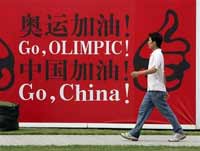China gets rid of air pollution and sex saunas for Beijing Olympics
After days of hazy, dark skies that fueled concerns about pollution levels during the Olympics, wind and rain helped clear Beijing's sky Tuesday, leaving officials hopeful for blue skies when the games start in just over one week.

The heavy haze was among the worst seen in Beijing in the past month, despite a series of drastic pollution controls put in force July 20 that included pulling half the city's 3.3 million vehicles off the roads, halting most construction, and closing some factories in the capital and surrounding provinces.
It is not known how much the measures have helped.
The skies over Beijing should remain clear for the next few days, said Zhai Xiaohui, a spokeswoman for the Beijing Municipal Environmental Protection Bureau.
"One other major factor is that the air flow has been better with windy and rainy weather conditions. It helps pollutants to dissipate," she said.
The National Meteorological Center said that rain is forecast for the next few days in Beijing.
The city's chronic air pollution has been a source of concern for Olympic organizers. The games, which will bring 10,500 athletes and hundreds of thousands of spectators to Beijing, open on Aug. 8.
The government has worked on cloud seeding to control rain, but acknowledged the wind remains an unpredictable factor.
Du Shaozhong, deputy director of the Beijing Municipal Environmental Protection Bureau, told a news conference that the air pollution index for particulate matter, a major pollutant, had dropped Tuesday.
The API dropped to 90 from 96 Monday, after reaching 118 on Saturday, a level classified as unhealthy for sensitive groups.
An API below 50 is considered good air quality and between 51 to 100 is moderate, according to the Web site of the Beijing Municipal Environmental Protection Bureau. But critics say moderate levels are still above the World Health Organization's guidelines for healthy air.
Beijing's air quality has greatly improved compared to the same period last year, and from July 1 all pollutants have been reduced by 15 to 20 percent, Du said.
The official China Daily newspaper said Monday that Beijing could pull more cars from the roads and shut down additional factories as part of contingency measures if air quality worsens during the Olympics.
In the meantime, Chinese authorities crack down on vice saunas in Beijing and other cities of the nation on the threshold of the Games.
Authorities in the city of Guangzhou are now requiring sauna clients to show their ID and register their personal information to try to limit China's booming sex trade, as well as prevent criminal suspects from hiding out, the paper said. The change came into force Monday.
Many massage parlors and saunas in China are fronts for brothels. The government has also cracked down on them in Beijing before the start of the Olympic Games next month.
"Some of these health centers have become dens of iniquity in past years owing to an absence of efficient supervision and management," He Jing, deputy director of the security bureau of Guangzhou, capital of booming Guangdong province, was quoted as saying.
The rule affects those going to massage parlors and saunas from 1 a.m. to 8 a.m., the paper said. Investigators will be regularly dispatched to enforce the rule.
Penalties will range from warning to revocation of business licenses, the newspaper said.
"On average, 100 clients stay overnight at our sauna center every day throughout the year. During peak periods, such as the biannual trade fair, as many as 300 clients stay overnight," a sauna proprietor surnamed Dong, was quoted as saying. A first name was not given.
"But last night when the regulation came into force, only 60 people stayed," he said.
Subscribe to Pravda.Ru Telegram channel, Facebook, RSS!


